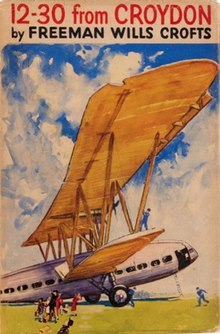 W
WThe 12.30 from Croydon is a detective novel by Freeman Wills Crofts first published in 1934. It is about a murder which is committed during a flight over the English Channel. The identity of the killer is revealed quite early in the book, and the reader can watch the preparations for the crime and how the murderer tries to cover up his tracks. The final chapters of the novel are set in a courtroom and during a private function at a hotel, where a résumé of the whole case is given in front of a small group of police detectives, solicitors, and barristers.
 W
W20,000 Streets Under the Sky is a trilogy of semi-autobiographical novels by Patrick Hamilton.
 W
WAnother Man's Wife is a 1934 novel by the British writer Marie Belloc Lowndes.
 W
WBlack August is an adventure novel by the British writer Dennis Wheatley. First published in 1934, it is set in about 1960, when an economic and political crisis causes a collapse of civilization.
 W
WBows Against the Barons is a 1934 children's novel by British author Geoffrey Trease, based on the legend of Robin Hood. It tells the story of an adolescent boy who joins an outlaw band and takes part in a great rebellion against the feudal elite. Trease's first novel, Bows Against the Barons marks the start of his prolific career as a historical novelist. It is notable for reinterpreting the Robin Hood legend and revitalizing the conventions of children's historical fiction in 20th-century Britain.
 W
WBurmese Days is the first novel by English writer George Orwell, published in 1934. Set in British Burma during the waning days of Empire, when Burma was ruled from Delhi as part of British India, it is "a portrait of the dark side of the British Raj." At the centre of the novel is John Flory, "the lone and lacking individual trapped within a bigger system that is undermining the better side of human nature." The novel describes "both indigenous corruption and imperial bigotry" in a society where, "after all, natives were natives—interesting, no doubt, but finally...an inferior people".
 W
WThe Chianti Flask is a 1934 mystery novel by the British writer Marie Belloc Lowndes.
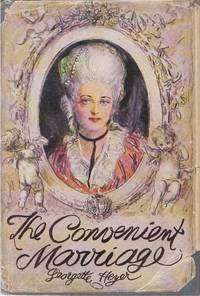 W
WThe Convenient Marriage is a Georgian romance novel by Georgette Heyer. The story is set in 1776. It is the first of several Heyer romances where the hero and heroine are married early in the novel, and the plot follows their path to mutual love and understanding. Later examples include Friday's Child and April Lady.
 W
WCoot Club is the fifth book of Arthur Ransome's Swallows and Amazons series of children's books, published in 1934. The book sees Dick and Dorothea Callum visiting the Norfolk Broads during the Easter holidays, eager to learn to sail and thus impress the Swallows and Amazons when they return to the Lake District later that year. Along with a cast of new characters, Dick and Dorothea explore the North and South Broads and become 'able seamen'.
 W
WThe Darkening Green is a 1934 novel by the British writer Compton Mackenzie.
 W
WDeath of a Ghost is a crime novel by Margery Allingham, first published in February 1934, in the United Kingdom by Heinemann, London and in the United States by Doubleday, Doran, New York. It is the sixth novel with the mysterious Albert Campion, aided by his policeman friend Stanislaus Oates.
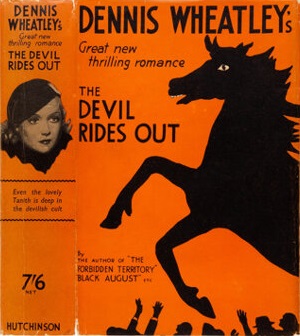 W
WThe Devil Rides Out is a 1934 novel by Dennis Wheatley telling a disturbing story of black magic and the occult. The four main characters, the Duke de Richleau, Rex van Ryn, Simon Aaron and Richard Eaton, appear in a series of novels by Wheatley. The book was made into a film by Hammer Film Productions in 1968. There is also an abridged, young adult version "retold" by Alison Sage for the "Fleshcreepers" series (1987).
 W
WGoodbye, Mr. Chips is a novella about the life of a schoolteacher, Mr. Chipping, written by the English writer James Hilton and first published by Hodder & Stoughton in October 1934. It has been adapted into two cinema films and two television presentations.
 W
WA Handful of Dust is a novel by the British writer Evelyn Waugh. First published in 1934, it is often grouped with the author's early, satirical comic novels for which he became famous in the pre-World War II years. Commentators have, however, drawn attention to its serious undertones, and have regarded it as a transitional work pointing towards Waugh's Catholic postwar fiction.
 W
WHoly Deadlock is a 1934 satirical novel by the English author A. P. Herbert, which aimed to highlight the perceived inadequacies and absurdities of contemporary divorce law. The book took a particularly lenient view of the need for divorces, which it characterised as "a relief from misfortune, not a crime", and demonstrated how the current system created an environment which encouraged the participants to commit perjury and adultery. The book was a major element in the popular debate about the liberalisation of divorce law in the mid-1930s, and helped pave the way for the 1937 statutory reforms.
 W
WI, Claudius is a historical novel by English writer Robert Graves, published in 1934. Written in the form of an autobiography of the Roman Emperor Claudius, it tells the history of the Julio-Claudian dynasty and the early years of the Roman Empire, from Julius Caesar's assassination in 44 BC to Caligula's assassination in AD 41. Though the narrative is largely fictionalized, most of the events depicted are drawn from historical accounts of the same time period by the Roman historians Suetonius and Tacitus.
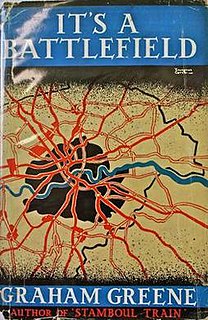 W
WIt's a Battlefield is an early novel by Graham Greene, first published in 1934. Graham Greene later described it as his "first overtly political novel". Its theme, said Greene, is "the injustice of man's justice." Later in life, Greene classified his major books as "novels" and his lighter works as "entertainments"; he ranked It's a Battlefield as a novel and not a mere entertainment.
 W
WA Man Lay Dead is a detective novel by Ngaio Marsh; it is the first novel to feature Roderick Alleyn, and was first published in 1934. The plot concerns a murder committed during a detective game of murder at a weekend party in a country house. Although there is a side-plot focused on Russians, ancient weapons, and secret societies, the murder itself concerns a small group of guests at Sir Hubert Handesley's estate. The guests include Sir Hubert's niece, Charles Rankin, Nigel Bathgate, Rosamund Grant, and Mr and Mrs Arthur Wilde. Also in attendance are an art expert and a Russian butler. Unlike later novels, this novel is more focused on Nigel Bathgate and less so on Alleyn.
 W
WMary Poppins is a series of eight children's books written by Australian-British writer P. L. Travers and published over the period 1934 to 1988. Mary Shepard was the illustrator throughout the series.
 W
WMr Noon is an unfinished novel by the English writer D. H. Lawrence. It appears to have been drafted in 1920 and 1921 and then abandoned by the author. It consists of two parts.
 W
WMurder on the Orient Express is a work of detective fiction by English writer Agatha Christie featuring the Belgian detective Hercule Poirot. It was first published in the United Kingdom by the Collins Crime Club on 1 January 1934. In the United States, it was published on 28 February 1934, under the title of Murder in the Calais Coach, by Dodd, Mead and Company. The UK edition retailed at seven shillings and sixpence (7/6) and the US edition at $2.
The Nine Tailors is a 1934 mystery novel by the British writer Dorothy L. Sayers, her ninth featuring Lord Peter Wimsey. It has been described as her finest literary achievement.
 W
WThe Power To Kill is a 1934 novel by the British writer Robert Hichens.
 W
WPrayer for the Living is a 1934 novel by Scottish writer Bruce Marshall.
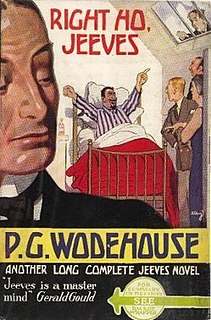 W
WRight Ho, Jeeves is a novel by P. G. Wodehouse, the second full-length novel featuring the popular characters Jeeves and Bertie Wooster, after Thank You, Jeeves. It was first published in the United Kingdom on 5 October 1934 by Herbert Jenkins, London, and in the United States on 15 October 1934 by Little, Brown and Company, Boston, under the title Brinkley Manor. It had also been sold to the Saturday Evening Post, in which it appeared in serial form from 23 December 1933 to 27 January 1934, and in England in the Grand Magazine from April to September 1934. Wodehouse had already started planning this sequel while working on Thank You, Jeeves.
 W
WShabby Tiger is a 1934 novel by the British writer Howard Spring. It was followed by a sequel Rachel Rosing in 1935.
 W
WA Spy of Napoleon is a 1934 historical novel by the British writer Baroness Emmuska Orczy. An illegitimate daughter of Louis Napoleon is taken on as an agent by Napoleon III, ruler of France, who wishes her to marry into and spy on the aristocracy who he suspects of wanting to overthrow him. Her lover, meanwhile, is sent to Switzerland to infiltrate revolutionaries there.
 W
WStorm Music is a 1934 novel by the English author Dornford Yates. It was first serialised in Woman's Journal and Woman's Home Companion.
 W
WThe Strange Boarders of Palace Crescent is a thriller novel by the British writer Edward Phillips Oppenheim, which was first published in 1934. It is set in a boarding house in London.
 W
WThank You, Jeeves is a Jeeves comic novel by P.G. Wodehouse, first published in the United Kingdom on 16 March 1934 by Herbert Jenkins, London, and in the United States on 23 April 1934 by Little, Brown and Company, New York.
 W
WThey Knew Mr. Knight is a 1934 dramatic novel by the British writer Dorothy Whipple.
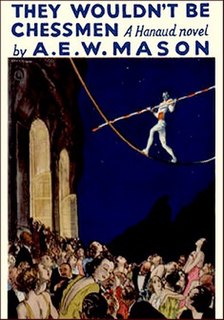 W
WThey Wouldn't Be Chessmen is a 1934 British detective novel by A.E.W. Mason. It is the fourth book in the Inspector Hanaud series of novels.
 W
WThis Little World is a 1934 novel by the British writer Francis Brett Young. It is set in a Worcestershire village in the early 1920s, where the recent First World War presages social change. It has a number of similarities with another of his books of the period Portrait of a Village, published three years later.
 W
WThree Act Tragedy is a work of detective fiction by British writer Agatha Christie, first published in the United States by Dodd, Mead and Company in 1934 under the title Murder in Three Acts and in the UK by the Collins Crime Club in January 1935 under Christie's original title. The US edition retailed at $2.00 and the UK edition at seven shillings and sixpence (7/6).
 W
WUnfinished Portrait is a semi-autobiographical novel written by Agatha Christie and first published in the UK by Collins in March 1934 and in the US by Doubleday later in the same year. The British edition retailed for seven shillings and sixpence (7/6) and the US edition at $2.00. It is the second of six novels Christie wrote under the pen name Mary Westmacott.
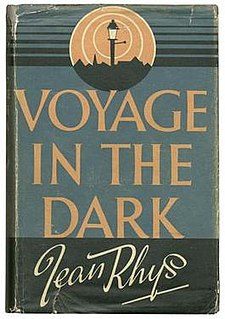 W
WVoyage in the Dark was written in 1934 by Jean Rhys. It tells of the semi-tragic descent of its young protagonist Anna Morgan, who is moved from her Caribbean home to England by an uncaring stepmother, after the death of her father. Once she leaves school, and she is cut off financially by the stepmother, Hester, Anna tries to support herself as a chorus girl, then becomes involved with an older man named Walter who supports her financially. When he leaves her, she begins a downward spiral. Like William Faulkner's The Wild Palms, the novel features a botched illegal abortion. Rhys' original version of Voyage in the Dark ended with Anna dying from this abortion, but she revised it before publication to the more ambivalent and modernist ending in which Anna survives to return to her now-shattered life "all over again." The novel is rich in Caribbean folklore and tradition and post-colonial identity politics, including black self-identification by its white protagonist.
 W
WWeymouth Sands was written by John Cowper Powys in rural upper New York State and published in February 1934 in New York City by Simon and Schuster. It was published in Britain as Jobber Skald in 1935 by John Lane. Weymouth Sands was the third of John Cowper Powys's so-called Wessex novels, which include Wolf Solent (1929), A Glastonbury Romance (1932), and Maiden Castle (1936). Powys was an admirer of novelist and poet Thomas Hardy, and these novels are set in Somerset and Dorset, part of Hardy's mythical Wessex. American scholar Richard Maxwell describes these four novels "as remarkably successful with the reading public of his time". The setting of this novel is the English seaside town of Weymouth, Dorset.
 W
WWhy Didn't They Ask Evans? is a work of detective fiction by Agatha Christie, first published in the United Kingdom by the Collins Crime Club in September 1934 and in the United States by Dodd, Mead and Company in 1935 under the title of The Boomerang Clue.
 W
WWinged Victory is a 1934 novel by English World War I fighter pilot Victor Maslin Yeates that is widely regarded as a classic description of aerial combat and the futility of war.